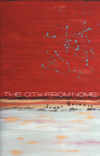The City from Nome
James Grinwis possesses a wry sense of things. He’s aware “Stuff has a way of perpetuating itself” (“Valse Triste”), and also of how important familiar haunts are. Where the poet walks, eats, and sleeps services his needs in and around the writing of poems. Grinwis comments on such matters from an appropriate distance and gives due acknowledgement, how “knowing your own corner / of the city” (“Shapes”) does allow for “you realize it’s just you, your room” where writing happens alongside the big realizations, such as “stars absorb light / like nothing else absorbs light” (“Still Life”). His poems are full of the irony of the mundane.
James Grinwis possesses a wry sense of things. He’s aware “Stuff has a way of perpetuating itself” (“Valse Triste”), and also of how important familiar haunts are. Where the poet walks, eats, and sleeps services his needs in and around the writing of poems. Grinwis comments on such matters from an appropriate distance and gives due acknowledgement, how “knowing your own corner / of the city” (“Shapes”) does allow for “you realize it’s just you, your room” where writing happens alongside the big realizations, such as “stars absorb light / like nothing else absorbs light” (“Still Life”). His poems are full of the irony of the mundane.
This business of living never gets easier and nothing is of much help in dealing with the messy state of it all, “as if there were a completely other / state to be in” (“Humility”), yet as Grinwis notes, perhaps referring to his sense of what having a muse is for, “I can think of worse things than a great beauty / who blows her world through you” (“A Name And”). When you’re a poet, always busy attempting to capture passing brilliance by way of words, “Sometimes it’s the whole world at once” (“Projection With Firing Squad”). Only the lucky get the opportunity to have reality match up exactly to how they envision it; the rest play catch-up, making do with how things are. Grinwis is as bounded in by the day-to-day concerns as anybody else:
I feel small, nervous,
and silly most days now.
She says to me, “look at
my body, my clothes, and
then look at yours,” which
I do, seeing how flat I am.
I turn to the window,
back to the life I’ve lived
through books so long. (“Case Study”)
More than just another portrait of the poet as lone figure surrounded by books and the words in them, Grinwis offers up a contribution rich with its own weird disturbances strung throughout, often painting the not-so-pretty: "A cluster of young children with sticks / are busy pummeling something." He does so as if casting a sci-fi/fantasy version of the world that verges on being a rather warped fairy-tale perspective. His poems are tales of strange characters in familiar situations or maybe familiar characters in strange situations—either way, this is territory into which poetry doesn’t often venture. Apparently, Grinwis has an affinity with the wolf as character totem, or alter-ego anyway, of one sort or another. The opening of the second section, “Untitled 10,” declares, “I pulled on my wolf suit and ambled across the wide snows" and even though later we’re told “I pulled off my wolf suit and paced the kitchen like something estrange” the sense of estrangement which comes from the association with the wolf hangs over all, as the wolf motif returns in the third section of the book:
An image is easy to fall in,
the woman’s curl like a lilac ribbon,
the arc of water, the greenery lining the houses
with a stillness and a wolf.
I want to ignore the wolf. I want to sleep
in the warm mattress of sleep,
and wake when there’s still time,
this would be good for both me and the wolf. (“Projection With Firing Squad”)
And in the poem “A Name And,” with the character “Moe” comes the revelation that
Moe knows wolves.
He loves them. The howl of a wolf
in the desert tells a lot about the sea.
There are a million reasons
why wolves howl.
While Grinwis withholds from even partially listing what some of the “million reasons / why wolves howl” might be (which might make for a book of its own), he is still relatively young and just getting started. This is his first collection, with a second, Exhibit of Forking Paths, slated to appear later this year from Coffee House. Perhaps along those “forking paths” the wolf will reappear. If not, Grinwis will no doubt nevertheless present more of the awkwardly illuminating perspective that’s uniquely his.




